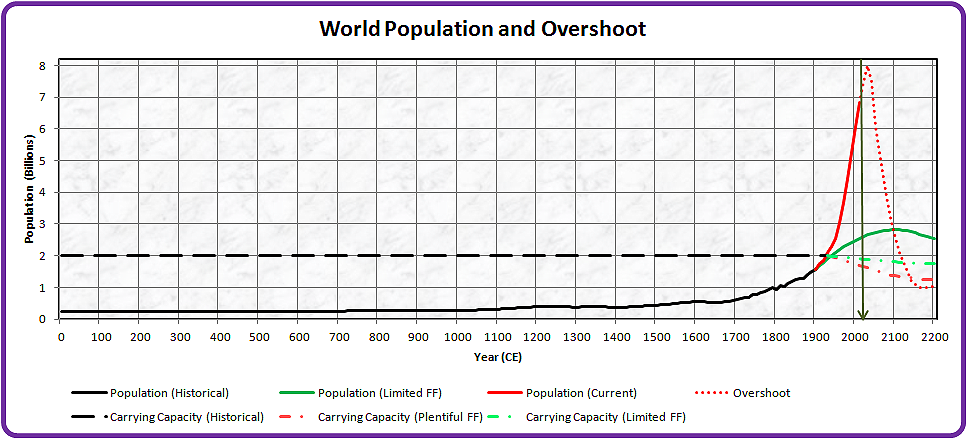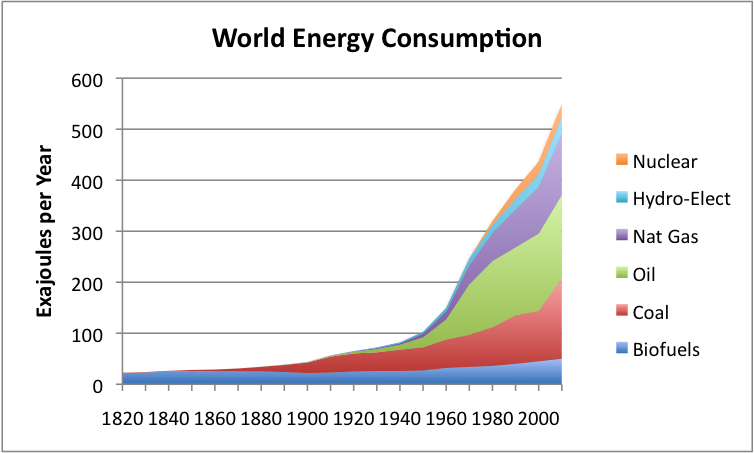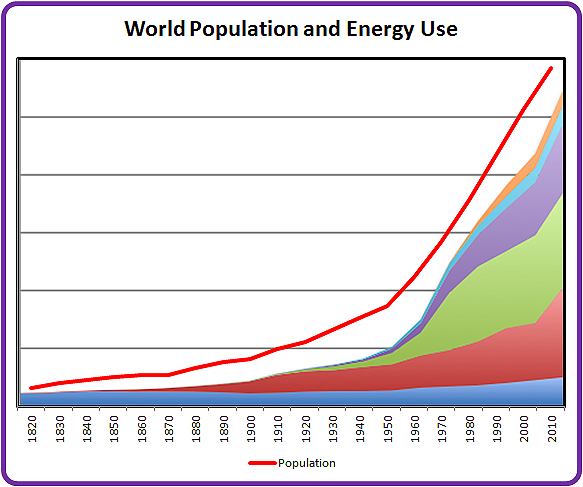Environment & Energy
Related: About this forumOvershoot - the road we couldn't take, and the road we did.
I posted about carrying capacity yesterday, and that got me interested in revisiting my assessment of the human situation, taking the influence of fossil fuels into account.
Population growth in the animal kingdom tends to follow a logistic curve: an s-shaped curve that starts off low when the species is first introduced to an ecosystem, then at some later point rises very fast as the population becomes established, then levels out as the population saturates its niche.
Humans have been on the front end of our logistic curve for our entire history. Our population has risen very slowly over the last couple of hundred thousand years, as we (very) gradually developed the adaptive skills we needed in order to deal with our varied and changeable environment (language, writing and arithmetic). As we developed and disseminated those skills our ability to modify our environment grew, and so did our growth rate.
If we had not discovered the stored energy resource of fossil fuels, we would probably be following the green curve in the chart below, and would be well on our way to achieving balance with the energy flows in the world around us, with our numbers settling down somewhere aroud two billion. This is the road not taken.
The road we have taken is the one in red, on which our numbers and consumption have been driven well past the world's long-term carrying capacity, deep into overshoot territory. As we partied hearty since 1900, we have degraded the flow-based carrying capacity of the biosphere by messing up the earth, air and water. As a result, when the party ends, the resulting correction will take us back well below a carrying capacity of 2-billion, since that no longer exists - we have already "eaten" much of it.
The inertia of the correction will carry us even below the remaining carrying capacity, which I currently estimate to be enough for about 1.25 billion people.

I don't think we can do anything to prevent the correction. We may have been in overshoot since 1920 or so, based on our usage of fossil fuels shown here:

Of course we've learned an awful lot since 1920. If we'd been on the green curve all along we wouldn't have developed wind or solar power, or large-scale hydro. We need to leverage as much of this knowledge as we can - not to prevent the Big Red Spike (we can't, it's already been happening for a hundred years) but to try and slow down the descent a bit, and maybe prevent the Dead Cat Bounce a century from now.
Oh, where did I pluck the carrying capacity of 2 billion from? It was the population of the planet in 1925, when we were already using some coal but had just begun to exploit the other two phases of carbon: liquid oil and natural gas. It seems as good a place as any to drive in my picket pin.
The details are all speculative, and open to change based on what assumptions you choose to make. The overall shape of the curve, though, will define the human operating environment over the next century or two.
RobertEarl
(13,685 posts)If there weren't so many people living and loving and laughing, like for instance, the two of us, then we may not have been born and all this jibber-jabber would have never happened.
But as it is here we are. We are fortunate. Very fortunate and what else is there?
villager
(26,001 posts)n/t
RobertEarl
(13,685 posts)I am a 'child' of parents. I am glad they had me.
Are you concerned about your children's future?
Do you think they will suffer in the coming days?
Jackpine Radical
(45,274 posts)If you don't hink we're in for some major and catastrophic changes in the relatively near future, then you're not paying attention.
RobertEarl
(13,685 posts)And when did you get around to figuring out the changes we are forcing would not be good changes?
n/t
kestrel91316
(51,666 posts)ZERO empathy for their fellow human beings.
I'm not sure you're going to be happy on DU if you keep displaying that sort of callous attitude toward your fellow humans.
RobertEarl
(13,685 posts)here we are Glider and I having fun living loving and laughing along with the rest of humanity and the question is: Isn't that enough?
Apparently some of us like to knee-jerk and attack others without even making an attempt to understand.
Not sure you're happy on DU if you keep displaying that sort of callous attitude toward your fellow humans.
kristopher
(29,798 posts)It is generally accepted that the most important inflection point in the past 200K years occurred about 10K years ago with the development of agriculture and settlements. Have you considered that you are placing too heavy an emphasis on fossil fuels and that you are missing the fact that what you are seeing as flat on your chart is actually part of the curves tail covering a period of early geometric growth into the available space with increasingly efficient agricultural techniques?
While energy is very important and fossil fuels have unquestionably played a major role, how would you explain the relationship of these two charts to your thesis. The first is distribution of population by political boundary and the second is GDP, which can serve for the moment as a proxy for fossil fuel consumption:

http://3.bp.blogspot.com/_pCDyiFUv9XU/ShMtRtF3zWI/AAAAAAAAEFM/ljupL-7ydQM/s1600-h/GDP+PIE.jpg
The link for the second chart is good, but it isn't displaying for some reason. What it shows is that population growth correlates very poorly with energy consumption.
Let's add one more piece of evidence to the discussion:
We submit that the models provided here present a compelling case that the road to a sustainable future lies in concerted efforts to move from fossil fuels to renewable wind and solar energy sources. This transition can occur in two or three decades and requires very little fossil fuel (on the order of one half of a year’s present global consumption) and no revolutionary technological innovations. Since our model uses conservative estimates, the true renewable potential that is available to our society may be even more optimistic than we show. The primary anticipated obstacles to implementing this transition are non-technical, including lack of political will and economic prioritization. Nevertheless, this transition in the time scale of a few decades is imperative for global climate security.
A Solar Transition is Possible
Peter D. Schwartzman & David W. Schwartzman
March 2011
David Schwartzman is Professor in the Department of Biology at Howard University. He is the author of Life, Temperature and the Earth: The Self-Or- ganizing Biosphere (Columbia University Press). He obtained a PhD in Geo- chemistry from Brown University in 1971.
Peter Schwartzman is Associate Professor and Chair of Environmental Stud- ies at Knox College. He obtained his PhD in Environmental Sciences from the University of Virginia in 1997.
GliderGuider
(21,088 posts)- Politics has nothing to offer this situation. The biophysical driver of fossil fuel energy transcends all political boundaries and philosophies.
- Fossil fuels have supplied 89% of the total primary energy used throughout the world over the last 55 years, and supply 87% of the energy used today, according to BP Statistical Review 2011).
- Agriculture started the ball rolling about 8,000 years ago, and got our population to 1.8 billion in 1900 without fossil fuels. But the logistical curve didn't take off until the serious use of fossil fuels began in about 1900. To a first approximation, everything we've done since 1900, including agriculture, has been the result of our use of fossil fuels. That's the point of the green line in the original graph.
- We are too close to the inflection point (~20 years or less), and have built too much fossil-dependent infrastructure, for renewables to do more that act as a buffer in some places against the most egregious effects of the decline.
- The correlation of primary energy and world population is self-evident. The following graph uses Gail Tverberg's energy graph from the OP as the reference point for energy.

kristopher
(29,798 posts)RobertEarl
(13,685 posts)You think we can save this civilization?
You should delve into an OP with your response. Make it detailed.
Who knows maybe you can save us!!
I, for one, don't think it can be saved. But what do I know?
kristopher
(29,798 posts)I really couldn't say. So far you have demonstrated no knowledge, just a proclivity for sharing your opinions.
RobertEarl
(13,685 posts)Share your idea on how to save civilization. Don't hold back. We are all breathlessly waiting for the great wise and all knowing Kristopher creed on how to save ourselves.
I'll bring the popcorn. I'll bet you will just duck, tho. And that's ok. Smarter people than either of us have tackled the problem to no avail.
GliderGuider
(21,088 posts)If you re-read my comment, you'll notice I didn't say it would help save civ. I said it was intended for people who wanted to. There's a difference.
It might help though - if you can figure out how you can use the knowledge to that end. Any knowledge can be used for any purpose, after all.
Saving civ really isn't my gig, though.
FogerRox
(13,211 posts)And the US Empire used oil as a work multiplier, that seems to agree with your estimate of 1925, when oil started taking over from coal. Maybe 1918? Or even 1914 - 1925 is a bit late for my tastes, but close enough. Gas powered trucks, tanks, and aircraft certainly showed the potential of oil products and caught the attention of the powers that be. All that needed to happen was to develop crude oil production to match the demand.
1925 works because by then cars and trucks were more common. But oil fired warships predated that by at least 10 years
http://en.wikipedia.org/wiki/Queen_Elizabeth_class_battleship
Italian and US Navies started going oil fired by 1910
http://www.epmag.com/archives/digitalOilField/5911.htm
The use of oil was essential in warship steam engines by 1887
http://www.cityofart.net/bship/engine.html
A bit off topic but interesting:
http://news.google.com/newspapers?nid=2507&dat=19390727&id=GkZAAAAAIBAJ&sjid=uYgMAAAAIBAJ&pg=5093,3849270
SO the stage was certainly set by the 1880's. And certainly by 1925 the die was cast.
GliderGuider
(21,088 posts)I think we were already heading into overshoot by 1900 - if we weren't quite in overshoot yet, it was just ahead. I used 1925 to pin my population numbers to the planet's carrying capacity. I think the earth could have supported indefinitely the two billion population we reached in 1925 - with the proviso that we didn't use any more fossil fuel than we were using then. Our our subsequent expansion of fossil fuel is what has driven us ever deeper into overshoot and simultaneously degraded CCo . I think CCo is around 1.8 billion now, and declining toward my ultimate estimate of 1.25 billion.
My date for entering overshoot is quite a bit earlier than the one proposed by Wackernagel and Rees, because the "ecological footprint" concept is a bottom-up approach that IMO doesn't give enough weight to the survival of other species or the accumulation of GHG since 1900.